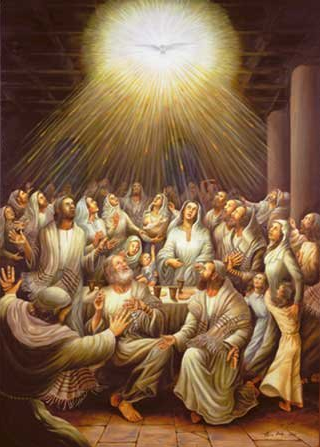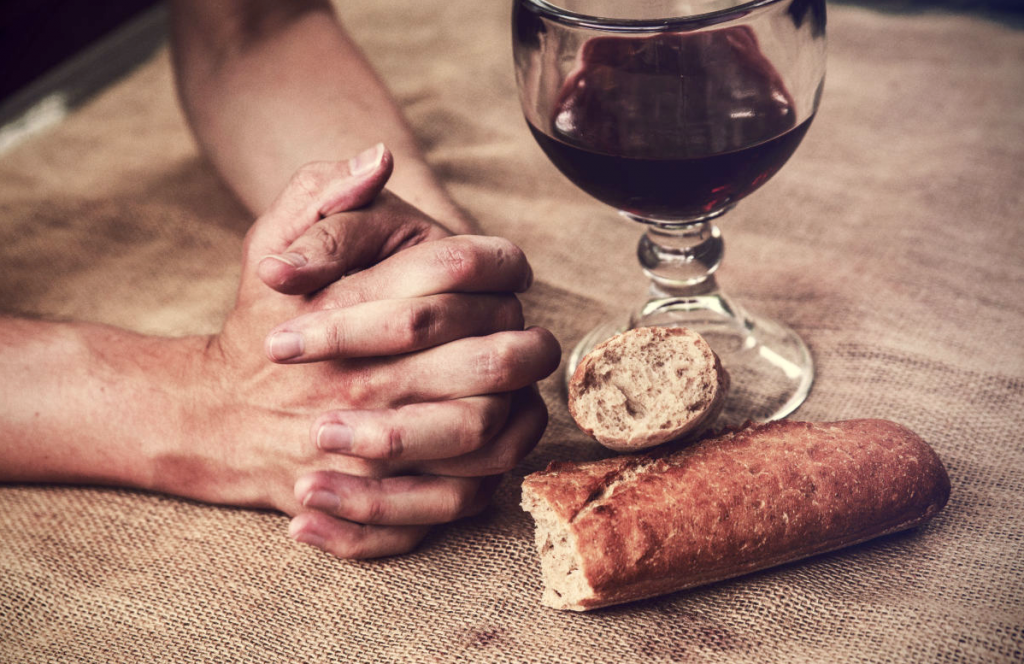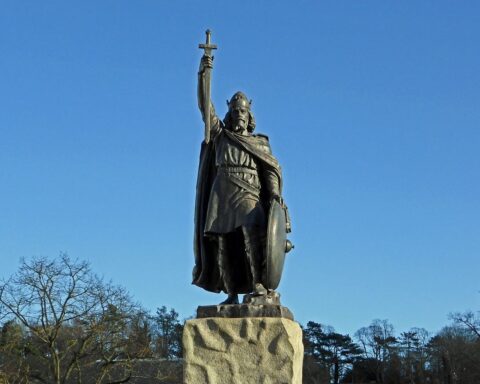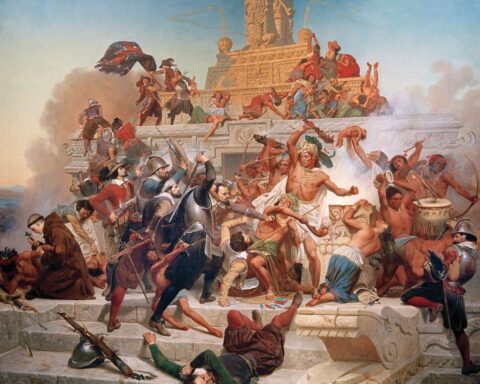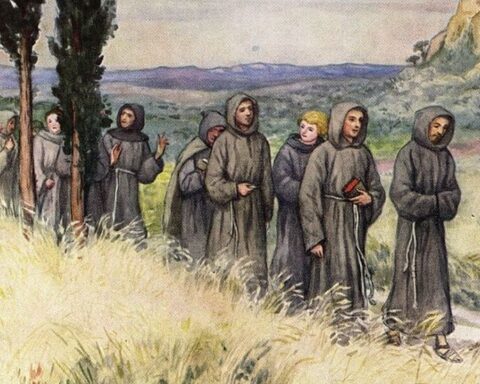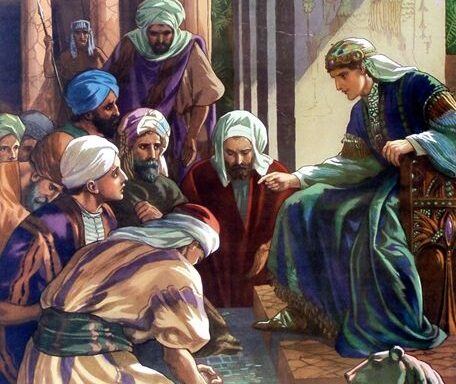Editor’s note: The following is extracted from The Village Tragedy and Other Sermons, by Rev. Clovis G. Chappell, D.D. (published 1921).
Acts 4:31
“When they had prayed” — what happened then? What took place? Were any beneficent changes wrought? Did any glorious results follow? Were the skies as black with night as they were before, or did they begin to be streaked by the hopeful fingers of the dawn? Was the earth still barren and drought-parched, or was there a blessed baptism of rain with the upspringing of varied and colorful life? What happened? Did wintertime remain, or was there a breath of warmth that made the icicles drop from the eaves of the houses, and the bare boughs of the trees to wave their verdant branches?
“When they had prayed” — if nothing took place, then I would not wonder if these early Christians ceased to pray. If no beneficent results followed, I am frank to believe that these practical men relegated prayer to the background as a useless expenditure of time. If nothing takes place today when men pray, of course it is not to be wondered at that so few really do pray. This is a busy age. We are hurried. We are cumbered with much serving. If prayer does not help, if prayer does not bring results — of course it is not to be expected that we be men and women of prayer.
But prayer brought results then. Prayer brings results still. “When they had prayed” — that is when the great moral revolutions were wrought in the life of the individual and of the world. That is the hour when new eras were born. That is the hour when all the great revivals started. “When they had prayed” — that is when all the great missionary movements looking toward the ultimate conquest of the world were launched. That is the date when empires were lifted off their hinges. That is the time when the church became “as fair as the moon, bright as the sun and terrible as an army with banners.” “When they had prayed” — that is when the great deliverances were wrought and God showed Himself mighty in the overthrow of His enemies.
Do you remember that bit of history of the chosen people? The messenger of Sennacherib has come to taunt the weak people of God. He offers to give them two thousand horses if they are able to set riders upon them. They know that they have no resources in men or in money. A little later there comes a letter warning the King Hezekiah not to let God deceive him with the promise that Jerusalem shall be delivered. “Did the gods of other nations deliver them?” he asked tauntingly.
When Hezekiah received the letter the story says that he went into the Temple and spread it before the Lord as if to say, “Lord, look what this boastful and arrogant king has written to me. Look how he has insulted thine own self.”
And then God’s answer came through the prophet Isaiah saying, “Because thou hast prayed to me against Sennacherib, King of Assyria, this is the word which the Lord hath spoken concerning him, The virgin, the daughter of Zion hath despised thee and laughed thee to scorn Therefore will I put my hook in thy nose and my bridle in thy mouth, and I will turn thee back by the way by which thou camest.” And so —
The Assyrian came down like the wolf on the fold,
And his cohorts were gleaming in purple and gold;
And the sheen of their spears was like stars on the sea,
When the blue wave rolls nightly on deep Galilee.
Like the leaves of the forest when Summer is green,
That host with their banners at sunset were seen;
Like the leaves of the forest when Autumn has blown,
That host on the morrow lay withered and strown.
For the Angel of Death spread his wings on the blast,
And breathed in the face of the foe as he passed;
And the eyes of the sleepers waxed deadly and chill,
And their hearts but once heaved, and forever grew still!
And there lay the steed with his nostril all wide,
And through it there rolled not the breath of his pride;
And the foam of his gasping lay white on the turf,
And cold as the spray of the rock-beating surf.
And there lay the rider distorted and pale,
With the dew on his brow and the rust on his mail,
And the tents were all silent, the banners alone,
The lances uplifted, the trumpet unblown.
And the widows of Ashur are loud in their wail,
And the idols are broke in the temple of Baal;
And the might of the Gentile, unsmote by the sword,
Hath melted like snow in the glance of the Lord!
And this happened “when they had prayed.”
“When they had prayed” — this, I say, is the greatest date in human history. That is the time when the wonderful things have taken place that only God can bring about in answer to prayer. When these men prayed something really did happen. The story related in the context is not a theory of what might have happened; it is a record of what really did happen. I am going to ask you to look at these facts, not in the exact order as here related, but to look at them and to bear in mind, as you look, that the same results will follow that same kind of praying today.
“When they had prayed they were all filled with the Holy Ghost.” These men were baptized with the Holy Spirit in answer to prayer. His personal presence was needed in order to enable them to meet the stern demands that were upon them. This same Spirit of Power is needed by the church today. It is not simply one need of the church. It is the supreme need. We have been forced to realize again and again that “It is not by might, nor by power, but by My Spirit, saith the Lord.” The knowledge has been forced upon us that “It is the Spirit that quickeneth, the flesh profiteth nothing.”
There are those today who hail with joy the growing interest in spiritism. Whether men do actually commune with the spirits of the departed, I do not know. The fact has not yet been proven to my satisfaction. But whether it is true or not true seems to me to be of no great importance. My biggest need is not for communion with the spirit of somebody who has died. My supreme need is for communion with the Almighty and living God.
Now, we might as well face the fact that the Church of Jesus Christ today is not claiming her spiritual birthright as she ought to claim it. I am sure that if St. Paul were to come into most of our churches today he would ask the same question that he asked of the little congregation at Ephesus years ago. You remember how Paul came to worship with the little church of twelve that had separated themselves from the seething tide of wordliness in that great and wicked city.
But when he came into the service he found something lacking. There was, one tells us, a want of glow, a want of enthusiasm, a want of thoroughgoing optimism. And this skilled Physician of Souls asked this question: “Did you receive the Holy Ghost when you believed?” And their reply was the sad confession that they did not even know that the Holy Spirit had been given. But the service did not close till they were all filled with the Holy Ghost.
Many of us are just where they were, and their need is our need. We are not the spiritual power that we might be and that we ought to be. That is one reason, I am sure, why so many strange doctrines have been able to make such progress in the world today. This I say, not excusing these false doctrines, but men have left our altars oftentimes because the fire had gone out upon them. And just as it is true that there is nothing so fascinating as a church alive with the Spirit of God, there is nothing more depressing than a dead church.
“They were filled with the Holy Spirit.” That is our need. We cannot do our work without Him. The task is too difficult. We are called upon to do the impossible. It is easy enough to organize and to preach and to sing, but we must “change the spots of the leopard, and give the Ethiopian a new skin.” We must go among the dry bones of the valley, and out of that death-shattered material, organize an Army for the King Eternal. We must be spiritual men.
And spiritual men we may be. There was a time when the baptism of the Spirit was for the few. There was a time when this blessed Sunlight gilded only the loftiest mountain peaks of our humanity. But today “This promise is unto you and to your children and to them that are afar off, even as many as the Lord our God shall call.” Today the Light is ready to spill its glory upon the smallest hillock and the most insignificant blade of grass. For “Upon my servants and upon my handmaidens will I pour out in that day of my Spirit, saith the Lord.”
“When they had prayed they were all filled with the Holy Ghost.” This is our need. This is our privilege, and the way to its realization is the way taken by these men long ago. For “If ye being evil know how to give good gifts unto your children, how much more shall your heavenly Father give the Holy Spirit to them that ask Him.” This power is waiting to come upon the church and the individual today as it came then, in answer to prayer.
The second result that followed when they had prayed was that “they spake the Word with boldness.” That is, prayer brought to them a new courage. Prayer will bring that same result still. Do you need more courage? Did you ever get surprised and pained at your own cowardice, at your own lack of boldness? I am sure I have been ashamed of my own timidity, of my own weakness and cowardice many times. I am sure that you could tell the same story.
I am likewise as sure of another fact, and that is that I have received new courage as a result of prayer. I have faced situations with fear and shrinking. I have faced tasks that seemed to me utterly beyond me. But as I have prayed I have found myself in the midst of these tasks with a courage and with assurance that was even a surprise to my own heart. I am sure hundreds of you have passed through a like experience.
Prayer does make for courage. I wonder what the little servant girl who saw Peter frightened into lying would have thought if she had seen him a few weeks later. In the Garden, you know, he slept when he should have prayed, and the crisis found him a coward. Later on he learned the secret of prayer and he stands before his enemies calmly courageous, saying, “Whether it is right to hearken unto you more than unto God, judge ye. We cannot but speak the things that we have seen and heard.”
It was when he had prayed that Luther found courage to defy all the enemies of his Lord in obedience to his convictions. It was when they had prayed that men have found courage to make trails into the wilderness, to cross unknown seas, to leave their bones to whiten under all suns and upon the shores of all continents.
Here is a martyr standing by the stake. Fagots are going to be lighted in a moment that will burn him to death. And with a calmness and courage utterly bewildering to those who stand by, he says to his executioner, “Feel my pulse and see if they are not calmer than yours.” How did he come by this courage? It is a courage born of prayer. It is said that the personal presence of Julius Caesar made every common soldier into a hero. Whether this is true or not I do not know, but I do know that the personal presence of Jesus Christ, keenly realized in answer to prayer, will make every man into a hero.
The third result that followed when they had prayed was that they were “of one heart and of one soul.” They became a really united people. Two men can not kneel together before a common God without coming closer to each other. Real prayer makes jealousies and bickerings and strife and hatred impossibilities.
Did you ever see a church that was torn into shreds because of hatreds and misunderstandings among its own membership? I have. That is when the devil takes a vacation so far as that church is concerned. He is no longer needed there. It is like the story we read of Cadmus.
Cadmus went once, you remember, and slew a dragon. He then pulled out all that dragon’s teeth and walked through a field and sowed them broadcast. When he reached the far side of the field and looked back he saw to his amazement that every seed had sprouted and grown up into an armed giant. He knew not what to do. But seeing how ill natured they looked, he picked up a pebble and hit one grouchy looking fellow upon the ear. Upon that, the man who had been hit blamed his neighbor. They fell to fighting and their fellows joined in, and each man killed his neighbor. And Cadmus had nothing to do but to stand with his thumbs in his vest holes and look on.
I have seen that same thing happen in the church. I was in a community some years ago trying to hold a revival. Day after day I preached in that ecclesiastical refrigerator without results. At last I demanded to know what was wrong.
They told me that certain leading members did not speak to each other and that some of them did not even speak to the pastor. The following sermon I used very plain speech, though I trust loving speech at the same time.
The result was that the leader in this business of hate invited me home with him. I told him I would come if he would let me bring his pastor. He did not speak to his pastor at that time. He hesitated. I told him further that I would not come unless I could bring the pastor. He consented.
When we reached this home we found other parties to the quarrel. I got them together and they started to tell how it was not their fault, and I said, “Let us pray.” And they found it hard to say to God what they had set out to say to me. Instead, when I called on the leader to pray, he burst into tears, confessed his sin and the others followed, and a new era was born in that community.
Prayer makes for unity in the local congregation and throughout the world. “When they had prayed they were of one heart.” They could hurl themselves like a projectile into the task before them. They were helping to make possible the dearest desire of Jesus expressed in His high priestly prayer, that they may be one. We need this unity today, not only in our local churches, but throughout Christendom. And it is a unity that will only take place when we have prayed.
The fourth result that followed when they had prayed was that “No man said that aught that he possessed was his own.” That is, there came to these men a sense of stewardship. They did not claim to belong to themselves. They did not claim that their possessions were their own. They realized that they were bought with a price. They realized that all they had, their lands, their houses, their money, all was to be put at the disposal of their Lord.
This sense of stewardship is needed in every congregation and by every Christian today. Some, I am happy to say, already have it, but many do not. There are still thousands of Christians who cling to an idea of ownership that is absolutely heathenish and diametrically opposed to Christianity. “When they had prayed no man said aught that he possessed was his own.” That is a realization that ought to come to every Christian throughout the wide world. It is not a conviction that is merely optional. It is a conviction that is an absolute necessity if we are to be the men and women that God wants us to be. When the church realizes God’s absolute ownership of all that they are and all they possess, when they acknowledge that ownership by the putting of at least a tenth upon His altar and the other nine-tenths at His disposal, when that good day comes, I am convinced that the final coming of the Kingdom will be almost at hand. And we are to hasten this good day by prayer. For a sense of stewardship came to these, as it will come to ourselves, “when they had prayed.”
The fifth result that followed when they had prayed was that “Great grace was upon them.” That is, I take it, that they became winsome Christians, fascinating, attractive Christians. I believe you will agree with me that that is a something that is much needed today. I am sure that the cause of our Lord has suffered no little from those who have been hideously and horribly religious. For believe me, there is a type of religion in the presence of which you want to “gnaw a file and flee into the wilderness.”
These men became gracious. “The beauty of the Lord rested upon them.” And I think I have never met a vitally spiritual man or woman who was not attractive. I think I have never known one single one who really knew how to pray who was not winsome and fascinating.
How attractive was our Lord! Mothers found it hard to hold their own children when He was by. I can see Him as they climb out of their mothers’ arms to go and climb into His and kiss Him on the lips and cling to Him till the disciples are horrified and try to keep them back. And Christ has to say, “Never mind. Let the children come and forbid them not, for the Kingdom of Heaven is full of them. I am used to them. I have millions of them in the House where I came from. So let them come. They do not worry me.” And they came because He was so attractive.
And there was that man Paul. From what tradition tells us, he was not anything wonderful to look at. A bit of a hunchback, maybe, with weak eyes, and yet sobs come to us this morning across the centuries.
And as we look back we see a group of men and women clinging to him on that distant seashore. They can not leave off hugging him and kissing him. “And they all wept sore and fell on Paul’s neck and kissed him, sorrowing most of all for the words that he spake, that they should see his face no more.”
Prayer will bring a new winsomeness. I am sure of it. I am sure, too, that we need that grace, every one of us.
A friend of mine told me of standing on the street corner in a certain city a few years ago talking to a friend of his who was a musician. While they were talking an organ grinder came close with a grind-organ and monkey and began to play. He said, “I saw my friend getting restless and I wanted to see how long I could make him stand it. At last he broke away and dashed up the street, saying, ‘That organ will run me crazy.’ And I tried to detain him telling him that he ought not to run, that the Italian was playing one of Handel’s masterpieces, but he went in spite of me.”
“Then,” he said, “a few weeks later we were together at the opera house and one of the greatest orchestras in the world was playing. And at the close of a certain selection I saw my friend standing on his feet in the chair frantically waving his program in one hand and his hat in the other. And I got him by his coat and gave him a jerk and said, ‘Sit down, you will make a fool of yourself.’ He said, ‘Let me alone. This is one of Handel’s masterpieces, one of the greatest pieces of music ever written.’ ”
And the strange part of it all was that the piece that the great orchestra had just played, that had set the man wild with enthusiasm, was the very same piece that the organ grinder had been grinding out on his hand organ, the same piece and yet rendered so wonderfully different. And there is a world of difference between the grand symphony of our Christian religion lived out prayerlessly in the energy of the flesh and lived out prayerfully in the energy of the Holy Ghost.
And last of all, “When they had prayed the place was shaken where they were assembled,” and the city was shaken, and finally the world was shaken. Prayer shakes things up. Yonder are two men in a Roman prison. Their feet are fast in the stocks, but at midnight they prayed, and when they had prayed the place was shaken. God took the prison in His hand and shook it as a dicer might shake his dice box and its doors flew open and every man’s fetters fell off from his hands.
Prayer has just that power still. It looses the might of God. Some years ago I was in a community to hold a series of meetings. The church was torn into shreds. The people seemed to be utterly without hope of any beneficent results. But I had invited a saintly old farmer friend of mine to stay in my home during those days. He was not a preacher. He was not a scholar, but he was greatly learned in the things of God and he knew how to pray.
One night after the meeting had been going on ten days without any results, he met me as I came down the aisle and took me by the hand and said, “Say what the Lord tells you to say tonight. I have had a vision. Something is going to happen.” I preached that night and every single man, woman and child that was in that crowded audience that was outside the church was brought to a profession of faith in Jesus Christ. And many of those who had grown cold were brought closer to God. When this man prayed the place was shaken.
Now, remember these glorious results came in answer to prayer. They come still in answer to prayer. And mark me, they come in no other way. The enemy is perfectly willing that we shall have the best church building in the city and the best preaching in the city and the best singing in the city- and the most skillful organizing in the city, if we will only leave off the might of God that comes only in answer to prayer.

